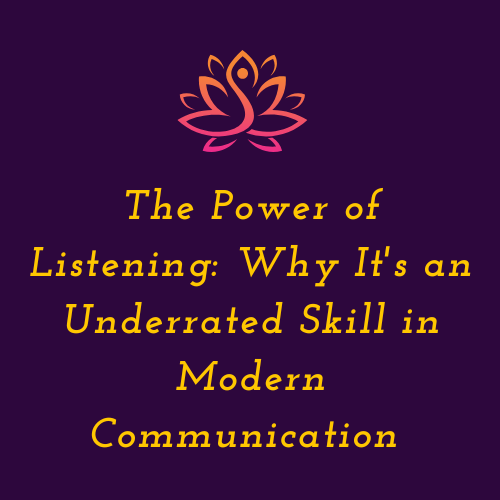The Power of Listening: Why It’s an Underrated Skill in Modern Communication

In a world about speaking up, sharing opinions, and “having a voice,” listening often feels like the quiet skill left in the shadows. Yet, listening—truly listening—is one of the most influential and underrated tools we have in communication. Imagine the potential impact if we all became better listeners. Think about how much clearer, kinder, and more effective our connections could be.
So, why is listening so essential, and how can it improve every conversation you have? Let’s dive into why listening deserves more attention and explore practical ways to strengthen this transformative skill.
Why Listening Matters More Than We Realize
When we think of effective communication, we usually focus on what we say, how we say it, and whether people understand us. But the other half of communication—the listening half—is just as important, if not more. Listening creates space for connection, empathy, and understanding, building bridges in our relationships that words alone can’t.
Listening isn’t just about hearing words; it’s about understanding emotions, needs, and perspectives. It’s about making the other person feel valued and seen, something that’s increasingly rare in our busy, digital world. We’ve all been in conversations where we feel someone’s only half-listening, waiting for their turn to speak or glancing at their phone. Contrast that with the feeling when someone is fully present, absorbing every word. It’s a world of difference.
When was the last time you felt truly heard by someone? How did it make you feel? Think about that as you consider the impact of listening on others.
Listening: The Secret Ingredient for Stronger Relationships
One of the biggest benefits of listening is its power to deepen relationships. When we truly listen, we signal to the other person that they matter to us. This is the basis of trust and respect, both of which are critical in any relationship—whether it’s with family, friends, colleagues, or clients. Listening allows us to understand others better, respond empathetically, and build stronger connections.
Good listeners often stand out in a professional setting. They understand team dynamics, pick up on subtle cues, and can anticipate needs or potential issues. They build rapport with co-workers and clients, creating a foundation of trust that’s crucial for collaboration and leadership. Simply put, good listeners are often more effective communicators, and that makes them more effective leaders, too.
Who in your life is a great listener? How has that impacted your relationship with them?
Practical Tips to Become a Better Listener
The good news? Listening is a skill that anyone can improve with practice. Here are some practical steps to help you become a better listener and transform your conversations:
1. Be Fully Present
This one seems simple, but it’s often the hardest in a world full of distractions. When someone is speaking to you, put away your phone, make eye contact, and give them your undivided attention. This small act shows the other person that you respect their thoughts and value what they have to say.
Tip: Try focusing on their words, tone, and body language. When you’re fully engaged, you’ll be amazed at how much more you absorb.
2. Practice Active Listening
Active listening means participating in the conversation without taking over. Instead of mentally planning your response while they’re talking, focus on understanding their point. Show engagement by nodding, giving small verbal cues like “I see” or “I understand,” or by reflecting back what they’ve said. For instance, say, “So, you’re feeling…” or “It sounds like you’re saying…”
Tip: Active listening creates a sense of collaboration. The person feels heard, and you’re more likely to gain insight into their perspective.
3. Resist the Urge to Interrupt
When we’re excited or passionate, it’s easy to interrupt, thinking we’re contributing. But interrupting can make the other person feel undervalued, as if what they’re saying isn’t important. Instead, let them finish their thought, even if you’re bursting to respond.
Tip: If you’re worried about forgetting your response, jot down a quick note. But remember, the conversation isn’t a debate; it’s an exchange.
4. Listen to Understand, Not Just to Respond
It’s natural to listen with the intent to reply, but listening to understand is a whole different approach. Instead of thinking about what you’ll say next, focus on understanding the other person’s perspective. You may find that, by the time they’re done, your initial response has changed because you understand them better.
Tip: When they finish, take a breath and summarize what they’ve said before sharing your thoughts. This pause helps ensure you’re responding thoughtfully.
5. Pay Attention to Non-Verbal Cues
Communication isn’t just words—it’s tone, body language, and expressions. Sometimes, what someone doesn’t say speaks louder than their words. Notice their posture, facial expressions, and tone. These cues give insight into how they’re feeling, helping you respond with empathy.
Tip: A person’s non-verbal cues can tell you if they’re nervous, excited, or upset. Acknowledging these cues can make your response more compassionate and attuned to their emotional state.
Embrace the Power of Listening
Listening may be quiet, but it’s one of the most impactful ways to show someone you care. When you make an effort to truly listen, you create conversations that are not only more meaningful but also more memorable. And here’s the magic: as you improve your listening skills, you’ll find that people start responding to you more positively. You become a person they want to open up to, a person they trust.
Ready to Transform Your Communication with Listening?
If these tips have sparked new ideas and you’re curious about mastering the art of listening, you’ll love my upcoming book, “Communication: The Key to Your Success.” It dives deeper into how listening can reshape your relationships and your life, with more insights and practical exercises to help you become an impactful communicator.
Stay tuned for the release, and in the meantime, practice these tips in your daily conversations. You’ll be surprised at how much a little listening can change your world.
#ListeningSkills #ActiveListening #CommunicationMatters #EmpathyInAction #ConnectionBuilding #PersonalGrowth #BetterRelationships #MindfulCommunication #CommunicationTips #BePresent



